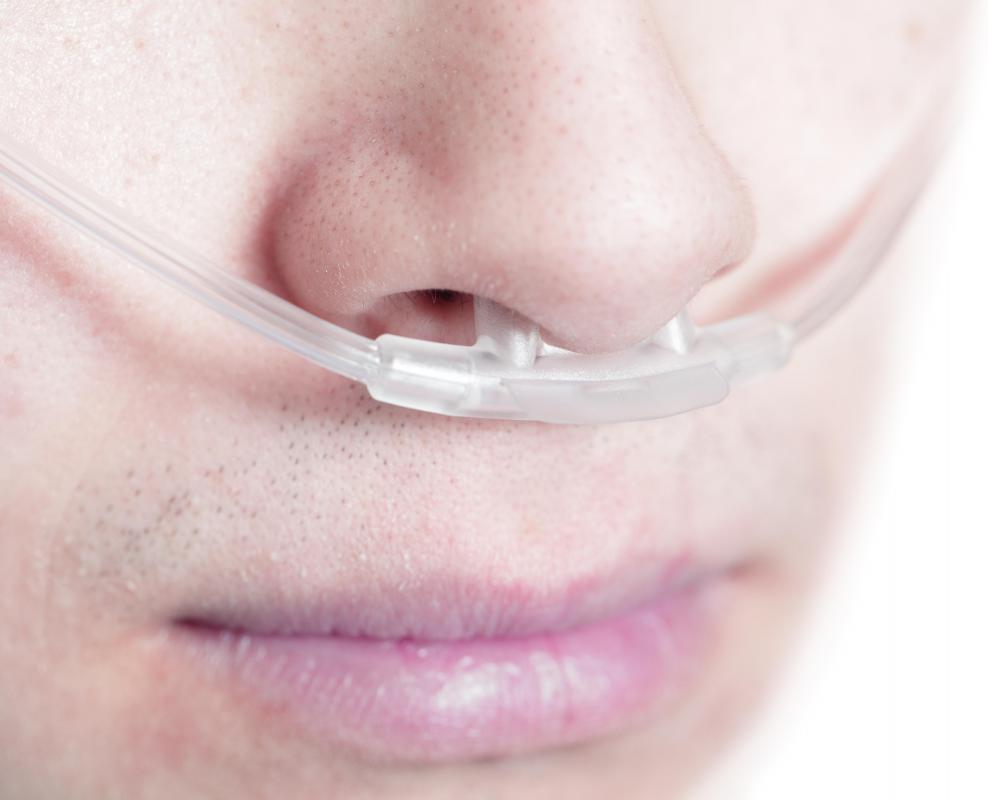At WiseGEEK, we're committed to delivering accurate, trustworthy information. Our expert-authored content is rigorously fact-checked and sourced from credible authorities. Discover how we uphold the highest standards in providing you with reliable knowledge.
What Is the Treatment for Aspiration Pneumonia?
Treatment for aspiration pneumonia can include medications to kill infectious organisms in the lungs, breathing support, and rest to help the patient recover. Several factors can play a role in treatment recommendations including the patient’s age and overall level of health, along with the severity of the infection. Some people may need to be hospitalized because their care needs are extremely complex, usually as a result of underlying illness or age. Once patients recover with treatment for aspiration pneumonia, they may need support for several weeks or months while they rebuild strength.
People develop aspiration pneumonia when they inadvertently inhale food, particulates from the air, or stomach contents. These can contribute to the development of inflammation, irritation, and infection in the lungs. Early symptoms can include coughing and feverishness. The patient may start to feel short of breath, very tired, and nauseous as the infection progresses. Testing for aspiration pneumonia can include listening to the lungs, performing an X-ray, and evaluating a blood sample for indicators of inflammation.

The first line of treatment for aspiration pneumonia is antibiotic medications to kill infectious organisms in the lungs. Some patients also need steroid medications, depending on the specific nature of the pneumonia. As the patient undergoes treatment, the lungs can be rechecked to determine whether the prescribed medication is working. It is usually possible to take antibiotics on an outpatient basis, as long as the patient isn’t at a high risk of complications and can breathe reasonably comfortably.

Patients who develop shortness of breath may need respiratory support in the form of an oxygen mask or full mechanical ventilation, where a machine breathes for the patient. In this situation, hospitalization may be part of the treatment for aspiration pneumonia because the patient needs to be monitored. Hospital stays can also be recommended for very old adults, who could experience complications, as well as people who have chronic illnesses that might interact with the pneumonia and cause a crisis. Someone with a swallowing disorder, for example, could start to choke on food or water while fighting pneumonia.

Frequent patient evaluation is an important aspect of treatment for aspiration pneumonia. Complications need to be identified early so they can be treated and resolved before they put the patient at serious risk. Patients cared for at home who notice a sudden decline in their condition can call their medical providers or a nursing hotline to determine if they need clinical care or a transfer to a hospital.
AS FEATURED ON:
AS FEATURED ON:

















Discussion Comments
@fBoyle-- No, aspiration pneumonia doesn't always require hospitalization. Like the article said, sometimes antibiotics and steroid medications are enough. It depends on how serious the infection and inflammation is, and also the lung capacity of the patient.
My aunt was once hospitalized for aspiration pneumonia. She had to be put on steroids and a ventilator because she only had forty percent lung capacity. She had a very hard time breathing.
@ankara-- Are you sure she had aspiration pneumonia?
As far as I know, aspiration pneumonia is very serious and requires hospitalization.
My daughter had aspiration pneumonia last month. The doctor said that there was dust or possibly pet hair in her lung which is causing inflammation and asthma like symptoms. Thankfully, all it took was a strong dose of antibiotics. She didn't even need steroids. She's all better now.
Post your comments